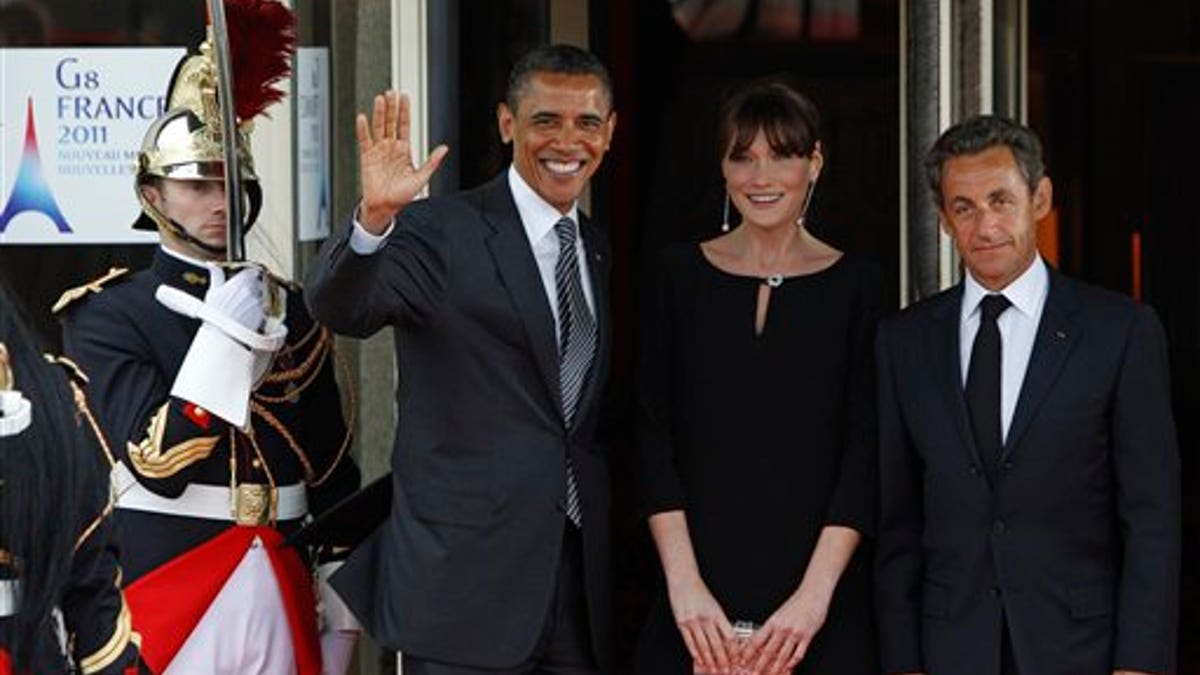
May 26: French President Nicolas Sarkozy and his wife Carla Bruni-Sarkozy welcome President Barack Obama during a dinner meeting for the G8 summit in Deauville, France. (AP)
DEAUVILLE, France -- Leaders of the world's rich democracies meeting Thursday are looking at tumult in the Arab world with both hope and fear.
They hope the new democracies in Egypt and Tunisia flourish and their economies rebound. And they fear that the war in Libya and uprisings in Syria, Yemen and Bahrain may entrench autocrats instead of defeating them.
At a two-day summit in this moneyed Normandy resort, President Barack Obama and the other leaders of the Group of Eight industrialized nations will seek to marshal their combined economic might behind the grassroots democracy movements that have swept the Arab world but have also driven away tourists and investors.
They'll also be talking about whether France's sharp and respected finance minister should take over the leadership of the International Monetary Fund. Europe wants Christine Lagarde to take over from Dominique Strauss-Kahn, who is facing sexual assault charges in New York -- but the United States, Canada and China are cautioning that developing countries should get a chance at the job, too.
German Chancellor Angela Merkel is calling for the G-8 to take effective measures to bolster emerging Arab democracy and to take a leading role in improving global nuclear safety. Merkel told the German parliament Thursday leaders must help ensure that "the initial political progress is not endangered by economic instability."
Concern about the euro currency and European debt woes will overshadow the talks among President Barack Obama, G-8 host French President Nicolas Sarkozy and the leaders of Britain, Germany, Japan, Russia, Canada and Italy in this cordoned-off beach town.
This year the leaders of Egypt, Tunisia and the Arab League will join the summit discussions. Several African leaders will also join for a special meeting Friday.
Thursday's talks start out looking at nuclear safety, with Japanese Prime Minister Naoto Kan scheduled to provide leaders with an update on the continuing crisis at the Fukushima Dai-ichi nuclear power plant.
Differences over online privacy and regulation may surface at a special session Thursday on the future of the Internet economy. Mark Zuckerberg of Facebook, Eric Schmidt of Google and other Internet executives took part in two days of debates in Paris this week that resulted in recommendations for the Deauville summit.
Egypt and Tunisia, where popular revolts this year overthrew authoritarian regimes, want to show that they are still sound investment destinations -- even though the future shape and policies of their governments remains unclear.
Sarkozy wants this to be the founding moment of a partnership between the G-8 and Arab countries.
That partnership may be strained, however, by tensions over how to handle Libya. NATO appears to have no exit strategy fromn the international air campaign launched two months ago to shore up Libyan rebel forces, and efforts to oust leader Moammar Gadhafi remain elusive.
Violence in Syria is likely to come up at the G-8 talks as well. Key European nations circulated a draft U.N. resolution Wednesday that would condemn Syria for its crackdown on peaceful protesters, U.N. diplomats said. The G-8 includes all the permanent Security Council members except China.
U.S. officials say it's too soon to reach a deal on dollar amounts for assistance to the Arab world.
The heads of the World Bank and the United Nations will also be present, and Strauss-Kahn's temporary replacement at the IMF, John Lipsky.
Germany and France are suggesting that the European Bank for Reconstruction and Development, with its experience helping underpin the transition from communism in eastern Europe, could be repurposed to help the Arab world.
A top Sarkozy official said the aid and investment to be promised to the Arab nations would resemble that which the then G-7 offered to Eastern and Central European nations after the collapse of communism in 1989. Post-Soviet Russia later joined the group, making it the G-8.
The G-8 has since lost some of its relevance with the growing clout of the Group of 20, which includes emerging economic giants such as China and India.
"A lot of the key issues are going to be in the G20, so we'll see how successful the G8 leaders are in showing that the old Western group is still relevant," said David Shorr of the Stanley Foundation.
Police and gendarmes fill Deauville and surrounding towns and highways. Local ports, train stations and the airport are shut from Wednesday to Friday, and a no-fly zone enforced over the town.
Anti-capitalist protesters and radical movements have sought to call the leaders' attention to the plight of workers and the world's poor, but are not organizing big demonstrations close to the summit because of the heavy security.




